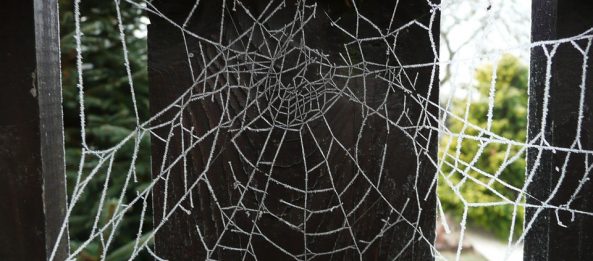In the world of nature, battles are fought daily that exceed in ferocity even those of our bloodiest, be it Waterloo, Stalingrad or Valley Forge. The natural contests differ from the human in that the former are conducted as a matter of survival and predatory food, whilst humans too often have mutually slaughtered for less justifiable reasons.
If you had been present in a garden shed in the West of Ireland, on a day when the sun shone brightly through the small rooflight, you would have witnessed a memorable spectacle being enacted: a fight to the death between a wasp and a spider. The spider is an astute tactician who knows well the importance of selecting the battleground best suited to neutralizing the wasp’s superiority in weaponry and manoeuvrability, to level the playing field. He must at the outset disable at least one of the wasp’s advantages in weaponry.
The battleground was an unusually strong web, right up in a shaft of strong sunshine. Of the forest of webs in this virtually untouched habitat, this fortification was of the strongest. A foraging wasp, minding his own business and failing to keep a sharp lookout, reported his blundering intrusion by a frantic acceleration of his buzzing wings. This (which is well known to a spider) is designed to enmesh the intruder deeper and deeper the more he struggles.
You would observe the entire web violently rocking, such was the energy of the wasp. You would find the spider, and he was a big one, waiting expectantly at the extremity of one web strand, from which position he could sally forth to any point of the web in attack. If you were familiar with spider strategy and language, you would understand that his tactics were to tire out the wasp until the point when he could rush in and deliver the paralysing bite.
It was a long wait. At intervals, the spider would make a rush towards the wasp, a manoeuvre that alarmed the wasp into a renewed frenzy of buzzing. Time and again he advanced and time and again retreated, as the fellow had obviously learned the wisdom of discretion being the better part of valour. As the buzzing got fainter and lower on the audio scale, you might predict how this was going to end. If you were a betting man, you’d be laying odds on the spider.
If you stayed until the denouement, you would have witnessed the countless rushes and retreats and the wasp’s failing strength, but nothing in nature is quite predictable, and, as the spider poised for the final coup de gras, the buzzing re-awoke to a sudden crescendo and the wasp broke free, mocking his erstwhile adversary all the while. The spider was left crouching at the edge of his torn flytrap, and one can imagine his chagrin, in spider language – Damn! If the wasp was trailing a metre-long string of web – for all the world like one of those advertising streamers towed by light aircraft – it was a small burden to carry for his triumphant escape. And if he was trumpeting his triumph over a wily enemy, who are we to criticise him?
Tony Tynan

Thanks Tony for painting this little scene so vividly!
+1. A brilliant, sharp reminder of nastiness, brutishness and shortness.
What words did Kavanagh put in Homer’s mouth again? “I made the Iliad from such a local row” wasn’t it? To those invested, any and every battle is Troy, be they Achilles, squalling farmers, or desperate insects.
Painting, even!